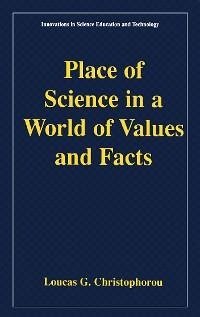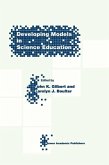Dieser Download kann aus rechtlichen Gründen nur mit Rechnungsadresse in A, B, BG, CY, CZ, D, DK, EW, E, FIN, F, GR, HR, H, IRL, I, LT, L, LR, M, NL, PL, P, R, S, SLO, SK ausgeliefert werden.
'"Place of Science in a World of Values and Facts" by Prof. Christophorou represents a tour-de-force of astonishing breadth on the subject, for both scientist and general reader alike. Only a person steeped in the scientific enterprise in all its dimensions, discovering new knowledge, performing experiments, teaching students, writing, and managing science could have such a thorough grasp of the subject matter and present it so eloquently and vividly. To then place all of this knowledge within the context of human history and cultural evolution is an achievement of the first order. The author's disciplined, well-structured thinking, consummate scholarship, extensive notes and citations, plus his comprehensive connections to other work leave the reader satisfied that this is an authoritative book that brings into focus most current thinking on this subject. His discussion of the development of physics is particularly lucid, and the few equations are used to illustrate the approach, not obfuscate the concepts. His injection of mythological analogies and early historical developments gives the book a dimension that makes a natural connection to humanity's early dilemmas and modern human's inability to deal with these. The author's idealism and faith in humanity's future is most evident in the discussion of the intersection of science and religion, and the necessity for both in addressing the conundrums posed by our modern existence. In many ways, this is not only a book about science but also an inspirational and hopeful book as well. I heartily recommend it!' -- Dr. Stamatios M. "Tom" Krimigis, Head, Space Dept., Applied Physics Laboratory, Johns Hopkins University
Martin Pope, Professor Emeritus, New York University
`"Place of Science in a World of Values and Facts" by Prof. Christophorou represents a tour-de-force of astonishing breadth on the subject, for both scientist and general reader alike. Only a person steeped in the scientific enterprise in all its dimensions, discovering new knowledge, performing experiments, teaching students, writing, and managing science could have such a thorough grasp of the subject matter and present it so eloquently and vividly. To then place all of this knowledge within the context of human history and cultural evolution is an achievement of the first order. The author's disciplined, well-structured thinking, consummate scholarship, extensive notes and citations, plus his comprehensive connections to other work leave the reader satisfied that this is an authoritative book that brings into focus most current thinking on this subject. His discussion of the development of physics is particularly lucid, and the few equations are used to illustrate the approach, not obfuscate the concepts. His injection of mythological analogies and early historical developments gives the book a dimension that makes a natural connection to humanity's early dilemmas and modern human's inability to deal with these. The author's idealism and faith in humanity's future is most evident in the discussion of the intersection of science and religion, and the necessity for both in addressing the conundrums posed by our modern existence. In many ways, this is not only a book about science but also an inspirational and hopeful book as well. I heartily recommend it!'
Dr. Stamatios M. "Tom" Krimigis, Head, Space Dept., Applied Physics Laboratory, Johns Hopkins University









